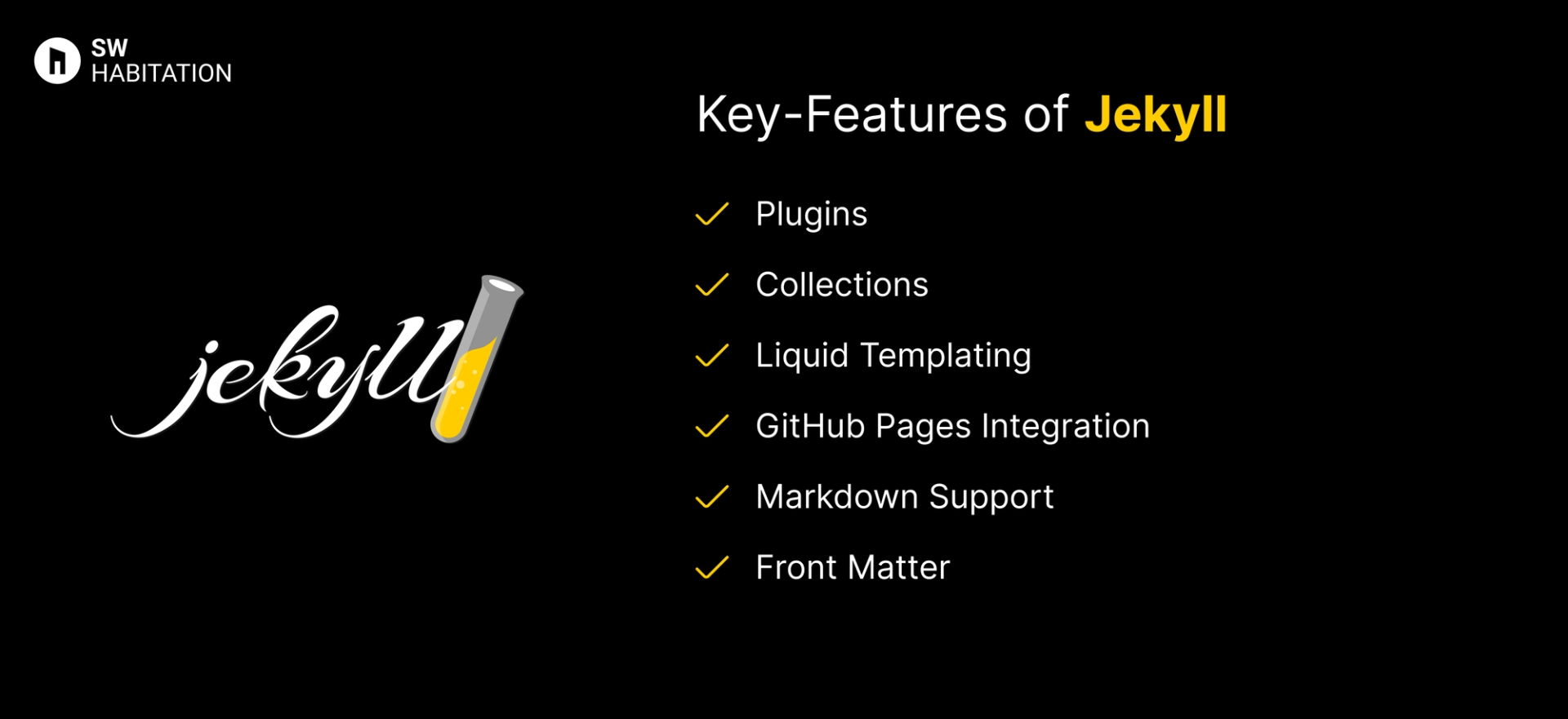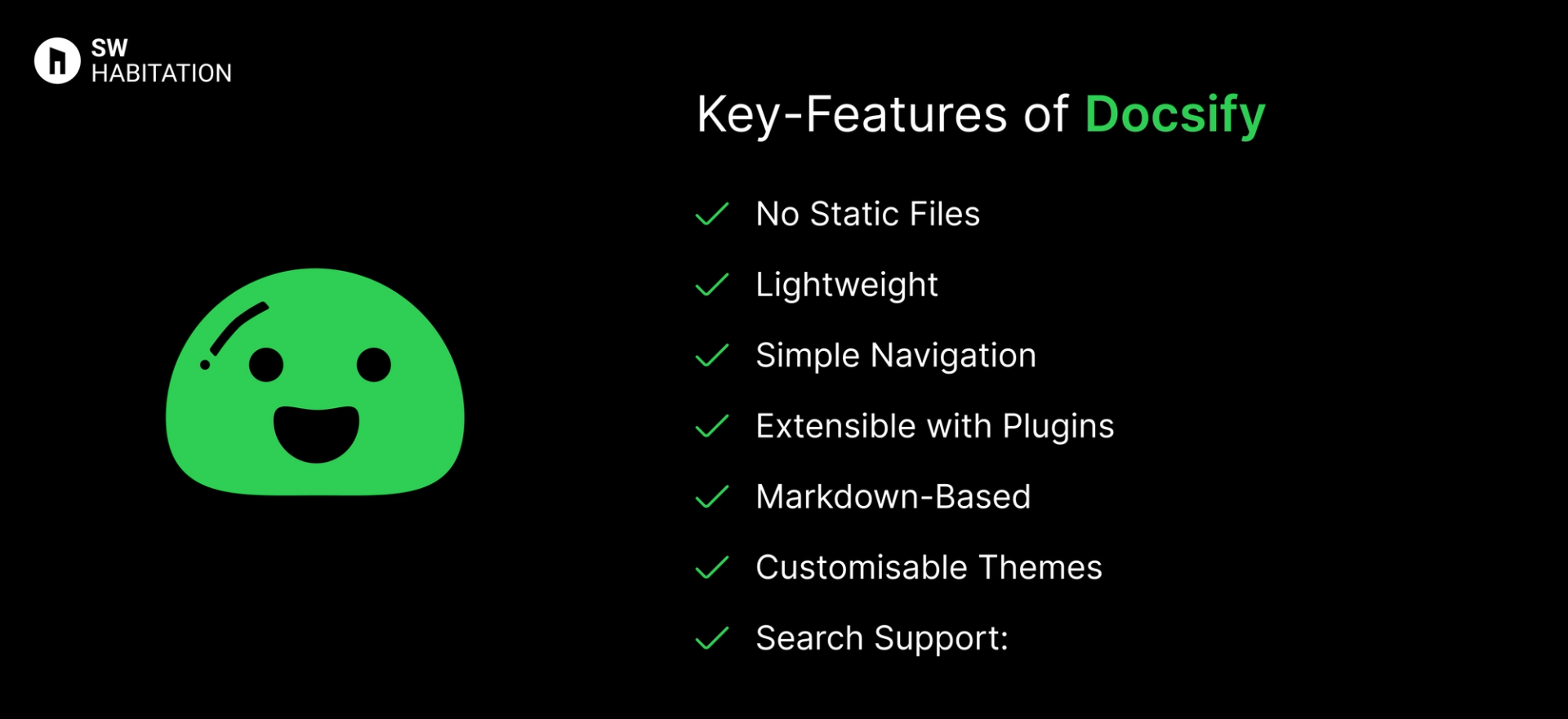Jekyll vs. Docsify

Jekyll

Docsify
Have you ever been to a website that loads super fast? Chances are it uses an SSG (Static Site Generator). It’s a tool that builds your site ahead of time, so when someone visits, they get the page instantly. No waiting around for things to load it’s just there.
What is Jekyll?
Jekyll is an open-source static site generator built with Ruby. It takes your text files (written in Markdown), processes them through templates, and generates a static website that you can deploy anywhere.
No databases, no server-side scripting it just pure HTML, CSS, and JavaScript. It’s super popular among developers, especially for creating personal blogs and documentation sites.
Key Features of Jekyll


- Plugins: Extend functionality with a rich plugin ecosystem.
- Collections: Organize content beyond just posts and pages.
- Liquid Templating: Use Liquid, a simple templating language, to customize your site.
- GitHub Pages Integration: Seamless deployment on GitHub Pages.
- Markdown Support: Write content in Markdown, and Jekyll handles the rest.
- Front Matter: Easily add metadata like titles, tags, and layout options.
Advantages of Jekyll
- Highly Customizable: Tweak layouts, templates, and styles to make the site your own.
- Active Community: Tons of tutorials, plugins, and themes to explore.
- Simplicity: No database, no backend — just Markdown and templates.
- GitHub Pages Friendly: Direct integration with GitHub Pages means free hosting and automatic deployment.
- Perfect for Blogs: Designed with blogging in mind, making it easy to manage posts.
Disadvantages of Jekyll
- Build Times: For very large websites, build times can get a bit slow compared to newer tools.
- Limited Dynamic Content: Since it’s static, things like user authentication or live updates need extra work.
- Requires Ruby: You’ll need Ruby installed on your system, which can be a hurdle for some.
What is Docsify?
Docsify is a documentation site generator that works by rendering Markdown files in the browser.
Unlike traditional static site generators, docsify doesn’t pre-generate static HTML files. Instead, it loads and renders content dynamically using JavaScript. This makes it incredibly lightweight and super easy to maintain, no need to rebuild the site every time you make a change.
Key Features of Docsify


- No Static Files: No need to pre-generate pages it renders them dynamically.
- Lightweight: The core library is tiny its just a single JavaScript file.
- Simple Navigation: Automatically generates sidebars and navigation.
- Extensible with Plugins: Add features like pagination, copy-to-clipboard, or Google Analytics.
- Markdown-Based: Write your docs in Markdown for simplicity.
- Customisable Themes: Adjust the look and feel with ease.
- Search Support: Built-in search functionality.
Advantages of Docsify
- Great for Small Projects: Perfect for simple documentation sites or project wikis.
- Super Easy Setup: No build step needed just drop a few files into your project.
- Light and Fast: No bulky dependencies, just pure simplicity here.
- Instant Updates: Changes reflect instantly without rebuilding the site.
- Minimal Learning Curve: If you know Markdown, you’re already halfway there.
Disadvantages of Docsify
- JavaScript Dependency: Requires JavaScript to render content, so it won’t work well in environments where JavaScript is disabled.
- Limited Scalability: Best for smaller documentation projects.
- No Static Files: Not ideal for SEO, as content is rendered client-side.
Comparison Between Jekyll vs Docsify
Use Cases of Jekyll
- Portfolios: Showcase your work with a simple, fast, and customizable site.
- GitHub Projects: The perfect companion for project documentation hosted on GitHub.
- Documentation Sites: Clean, simple, and easy to organize docs.
- Personal Blogs: Its blogging-focused features make it a favorite for tech blogs.
Use Cases of Docsify
- No-Build Workflows: If you hate build steps, Docsify’s dynamic loading is a dream.
- Markdown Lovers: Write everything in Markdown and let Docsify handle the rest.
- Small Projects: Ideal for simple projects, personal wikis, or README-driven sites.
- Quick Documentation: Need a doc site in minutes? Docsify delivers.
Other Resources
Conclusion
Static Site Generators are a big game changer if you’re looking to build a website that’s fast, secure, and easy to maintain. Whether you’re launching a personal blog, portfolio, or a business website, they give you the freedom to focus on what really matters, your content and your users without all the extra complexity.
The best part? You’re not locked into one way of doing things. You can choose the tools and tech you’re most comfortable with, and scale things up as your site grows. From lightning-fast load times to better SEO and easy hosting, SSGs make the whole process smoother.
At the end of the day, it comes down to what fits your workflow and goals best. Pick the one that feels right to your requirements, and you’ll be well on your way to creating a beautiful, high-performing website that you’re proud of 🙌
Frequently asked questions
Is Jekyll easy to set up?
Yes, Jekyll is developer-friendly and has great documentation. However, it does require Ruby and some command-line usage to set up and deploy.
Can I host Jekyll on GitHub Pages?
Yes, Jekyll integrates seamlessly with GitHub Pages, allowing you to host your site for free directly from your GitHub repository.
Does Jekyll require a database?
No, Jekyll is file-based, meaning your content is stored as Markdown or HTML files. It compiles everything into static files, so there’s no need for a database.
What is Jekyll good for?
Jekyll is perfect for building blogs, documentation sites, portfolios, and personal websites. It’s highly optimized for Markdown and Liquid templating.
Is Docsify beginner-friendly?
Absolutely, Docsify is designed to be simple and easy to set up plus its is ideal for anyone who needs to create documentation fast.
Can I customize Docsify?
Yes, Docsify is highly customizable with themes, plugins, and configuration options. You can tailor it to fit your branding or specific project needs.
Does Docsify require a static build?
Nup, Docsify generates your docs on-the-fly in the browser. Just write Markdown, and Docsify takes care of the rest.
Is Docsify good for small projects?
Yes, Docsify is excellent for creating quick documentation sites and smaller projects without the overhead of a static build process.
